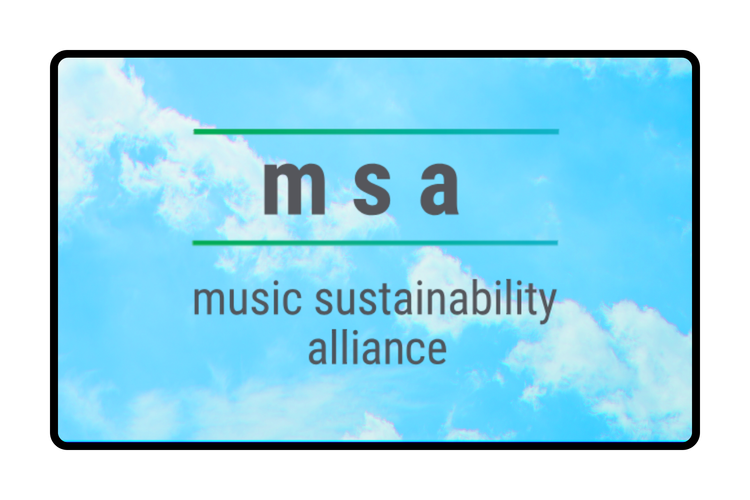
Record labels:
How to get started on environmental action
🤔 Not sure where to start?
Here’s how you can take your first steps on the Music Climate Pact commitments. We suggest choosing the most relevant practices for your organisation. Top tip: Start where you can; don’t worry about perfection. The goal is to enable positive change in a way suited to the label.
🎯 Commit to targets
Put in place an environmental policy and action plan with annual reduction targets (e.g. these could be by emissions percentage or by project).
Ask whether you are targeting the areas within your business that make the most emissions, create the most air pollution, or are hurting nature the most.
Focusing on what you can do immediately is important as we need urgent change, from there think about future targets.
Create opportunities for environmental leadership and team participation. You can make environmental sustainability a priority by nominating someone to create a positive environmental impact and reduce the negative.
Committing to the same framework as others, and that has validation from others, can help guide you and give momentum to action. A few possible frameworks for this are Race to Zero or SBTi. The SME Climate Hub may be a useful place to start. Likewise, you can use the Music Climate Pact’s Commitments as a framework.
Review any relevant legislation that applies to you. These may be regional, national, industry-based or other.
🤝 Partner with shared suppliers
and digital streaming platforms (DSPs)
Digital Streaming Platforms
Digital Streaming Platforms (DSPs) create emissions while streaming music supplied by labels. It’s important to understand how our music is progressed through digital networks, the environmental impact of that, and how we can work together.
For digital services emissions, outside the scope of labels, the Music Climate Pact has a Working Group that is talking to key digital service providers about their sustainability policies.
MCP Supporter Earth/Percent has been working with UNLive and several DSPs to create Sounds Right. Working with them may be a great way to start nurturing partnerships between your artists and DSPs.
Suppliers
It is likely that your suppliers have the most control over your indirect carbon emissions (some or all of your Scope Three emissions). Working with suppliers to decarbonise the supply chain is vital for transformation.
Start this conversation by asking your suppliers what they are already doing.
Consider offering a learning session for your employees to understand how to use their company spending for good
It’s likely that by starting with the suppliers listed below, you’ll be targeting your most significant and relevant emissions sometimes called, ‘material emissions’.
Please note: These are simply a starting point for carbon reduction and in no way suggest business, financial, investment advice.
Your banking supplier
Switching to a bank that doesn’t invest in fossil fuels is a powerful first step. See switchit.green for more information.
If you can’t switch, then ask your bank for their sustainability policy and follow up with them on what you’ve read (or haven’t). Pressure from customers like you can help persuade all banks to commit to divestment from major contributors to the climate crisis such as fossil fuels.
Likewise, if you can’t switch your business current account but can switch your savings or investment accounts, this is excellent work too.
Your pension supplier
Ensure your company pension provider is an organisation divested from fossil fuels.
Make My Money Matter have an open letter to send to the worst offenders and a financial advisor can help manage a switch.
Your energy supplier
Switch to a renewable energy supplier or ask your landlord to switch. You can use switchit.green to find a supplier.
Get an energy efficiency assessment carried out on your building.
📏 Measure & reduce greenhouse gas emissions
Measuring emissions – how to do it
Carbon accounting allows you to measure the carbon footprint of your operation. By understanding where your largest impacts are, it will be clear where the most effective reductions can be made. It also allows you to create a baseline from which you can reduce your impact. Taking action is also good for business as not only does it help to measure and reduce, but also leads to other concrete benefits, see more here.
There are many cross-industry carbon accounting tools with support available which are not industry-specific. A good rule of thumb is to ensure any tools or frameworks you use follow the GHG Protocol.
Alternatively, the IMPALA Carbon Calculator is a bespoke tool that has been designed especially for record labels by Music Climate Pact supporters, IMPALA. Powered by environmental non-profit Julie's Bicycle, and supported by Merlin and Murmur, it is free to use for IMPALA members. A US pilot is already underway with A2IM and Merlin.
The IMPALA Carbon Calculator focuses on key emissions impact areas: Business travel, manufacturing, distribution, and merchandise. The support team can help with the next steps needed for your business. There is also a music-specific tool for use in Chile here.
By adopting an industry-specific tool, you offer the industry general insight into where our combined emissions are coming from. Plus, you can also understand whether your emissions are in line with industry norms.
Thanks to tools like this we know a label’s greatest emissions will likely be in Scope 3 so it is important to include these in your accounting, regardless of the tool you choose.
To know more about the differences between Scopes 1, 2 & 3, you can start with this infographic and this explanation.
Emissions Reduction
-
Prioritise manufacturers that:
Are local to where you’ll be selling the product
Will help you avoid overstock of products
Embed recycling, circularity and minimal waste into their work
Implement environmental policies
Have premises powered by 100% renewable electricity
-
Press vinyl at 140 gram instead of 180 gram. The sound quality is identical on the majority of listening equipment, but the carbon footprint from manufacturing and shipping is proportionally lower.
-
The best packaging is lightweight, full-card packaging, giving preference to post-consumer recycled card.
Recycled card feedstock is even better.
As a minimum, use card from FSC or PEFC-certified sources.
Avoid materials such as thick plastic laminate, UV inks and varnishes, metallised gold, silver and glitter – all of which add toxicity to the environment and make it impossible to recycle.
Explore options like switching from plastic to card packaging for CDs, and use recycled or FSC-certified paper and card.
-
Avoid overstock by introducing a ‘create-on-demand' model. Another way to do this is by eliminating runs designed for specific campaigns. Avoid products made from plastic, have a limited use or lifespan, and are likely to end up in landfill.
For clothing & textiles:
Use certified (e.g. Soil Association, Global Organic Textile Standard [GOTS], Fair Trade) organic cotton fabrics or clothing made from more sustainable fibres like bamboo or hemp.
Look out for the OEKO-TEX-certification, which tests materials for harmful substances.
Clothing made from recycled, post consumer waste and embrace the circular economy are powerful ways to reduce impact.
Use your merch company's experience on the popularity of each size to limit over-ordering.
For other merchandise:
Explore ranges that support a sustainable mindset (e.g. reusable coffee cups)
Consider unusual brand partnerships that amplify positive impact
-
These processes are much cheaper and have a much lower carbon footprint:
Minimise any unnecessary transport by manufacturing the product in the country where it will be sold.
Shipping direct to distributors from pressing plants rather than via a distribution centre
In addition:
Choose distributors that are already using electric trucks and vans
Use sea freight, which is significantly less carbon intensive, than air for freighting LPs, merch and more
-
Eliminate single-use plastics and styrofoam
Go meat- and fish-free for your event catering
Introduce themes like Meat Free Mondays in the office
-
Enable staff to reduce their footprint by using public transport, electric hire cars, bike or foot by:
Offering a salary sacrifice or staff perks schemes to purchase season tickets or bicycles (your country may also have established schemes like the UK's Cycle to Work Scheme).
Help your staff by installing safe bicycle lock-ups, providing showers, offering EV charging in office parking lots or even organising regular bike maintenance days.
If buying new vehicles for your business, prioritise: 1) electric vehicles 2) used vehicles. If you lease cars for staff, make these electric.
Long-distance travel:
Reduce or eliminate air travel where possible: Zoom and Teams are gamechangers.
Use national rail companies and Eurostar for UK and European travel.
Consider banning domestic air travel where train travel under 6 hours is available.
If flying is necessary, consider implementing no ‘single-use’ travel, so that business trips are not for a single reason.
Where flying is necessary, fly economy. Business and First Class have significantly higher footprints.
Offer staff 'travel days’ if they take trains instead of flying for their holidays. Finally, consider adopting an Employee Benefit Scheme like Climate Perks.
Most carbon accounting tools include travel measurement, but if this is your main impact area, you can use a travel-specific tool like onboard.earth.
-
The most impactful way to reduce emissions is to switch to renewable electricity. If you can generate your own electricity through solar panels, that’s even more efficient.
Other methods:
Shift from gas heating to heat pumps in countries where the latter are available.
Invest in LED lighting.
Inform and educate your teams to switch off and reduce the energy use from heating and air conditioning while maintaining comfortable working temperatures.
When refurbishing and fitting out, choose low impact materials and look at sourcing second-hand furniture.
If you're in a rented office, ask landlords about their sustainability credentials and make this part of the criteria for choosing any new office spaces.
-
For your servers and own websites:
Switch to servers that use 100% renewable electricity.
You can design your website to use less energy (e.g. compressing pictures, limiting rich video content, etc.) You might find these resources helpful here and here.
Computers and other electronic equipment:
Buy refurbished if you can
Look for 'A' energy efficiency ratings
Use equipment for as long as possible
-
First and foremost, do everything possible to not create landfill:
Take care of what you own and repair it when possible to ensure longevity.
Through re-sale or charity look for future users of anything you are no longer using.
If a new user can’t be found, check if the manufacturer will refurbish and resell or recycle the product.
When this is not possible, use other recycling services available in your area.

🎤 Support artists TO SPEAK UP
Record labels can support artists by enabling them to speak out about the issues that matter to them. Artists’ voices matter and can amplify and inspire the societal and cultural transformation needed to tackle the climate crisis.
Empower your artists by:
Ensuring they know about the communication support that is available.
Consider signposting them to Murmur Artist Support, EarthPercent, Music Declares Emergency, Climate Action Network groups, or Heard artist impact training.
There is also significant support for artists in reducing their impact, for instance in touring.
Artists and tour managers can reach out to LiveGreen for resources such as building green riders.
🎙️ Communicate with fans
It is important the music industry communicates openly with music fans about its own environmental impacts. The more the industry can share, the easier it becomes for the consumer to naturally shift habits towards lower emission choices.
If you wait till you’ve figured it all out, you will have missed opportunities to bring fans with you on your journey. Instead, consider sharing the experiments, imperfections, learnings and outcomes. Be wary of greenwashing, but equally, don’t let greenhushing get in your way. Honesty and transparency count for a lot. Positive and problem-solving messaging carries weight.
Communicate your hard work effectively by:
Creating a webpage where fans can read about your environmental policies, carbon audits, and the positive work you do to reduce your impact. Many of the Music Climate Pact Signatories have webpages to explore and learn from
There are many other forms of communication: merch, socials, packaging, newsletters, press and more. Consider how you can inject environmental messaging into each of these
Ensure that your press and communication team has the right knowledge and training to support your work. Climate Outreach, Purpose Disruptors and Creatives for Climate offer services that can support staff
Consider supporting fan-focused initiatives such as Music Declares. Likewise, it might make sense to partner with a brand that aligns with your workplace ethics
✍️ Work together to develop impact methodologies
As you work through carbon auditing you may find there are different ways or no clear way of counting some emissions. Some frameworks for carbon measurement still need to be figured out, particularly things which our specific to our industry.
Please speak with others (like us!) when you hit what may look like a dead end. It’s important that we work together as a global industry and ensure the methodologies, tools and frameworks we need are created, backed by climate science, and can be used by all.
Some examples of this work include:
The MICC group: The Music Industry Climate Collective (MICC), whose founding members are all signatories of the Music Climate Pact, are developing a sector-specific guidance for how to think about Scope 3 emissions in the recorded music industry
The Music Climate Pact and Murmur, along with other stakeholders are working on methodologies to understand the emissions created by the production of vinyl. The end result of this work will be made public so that the industry can better understand its impact.
The advice here was compiled on behalf of the Music Climate Pact by Pact Supporters Music Declares Emergency and Julie’s Bicycle (whose contributions to the Music Climate Pact are [supported through/funded through/made possible by] EarthPercent) with support from BPI and AIM.
Any information provided on this webpage is given for your general information purposes only and to inform you about initiatives, suppliers, services, and other websites that may be of interest, but has not been tailored to your specific requirements or circumstances. It does not constitute technical, financial or legal advice or any other type of advice and should not be relied on for any purposes. We do not endorse, recommend or accept responsibility for any such third-party products, services, their websites, or for any information, opinions, or views given or advice provided by such third parties (whether on their websites or otherwise).
If you are a stakeholder to the music industry and have ideas as to how to make this list better or if you are an industry supplier and would like your lower emission efforts to be listed here, please get in touch. See our FAQs page here for more information.















